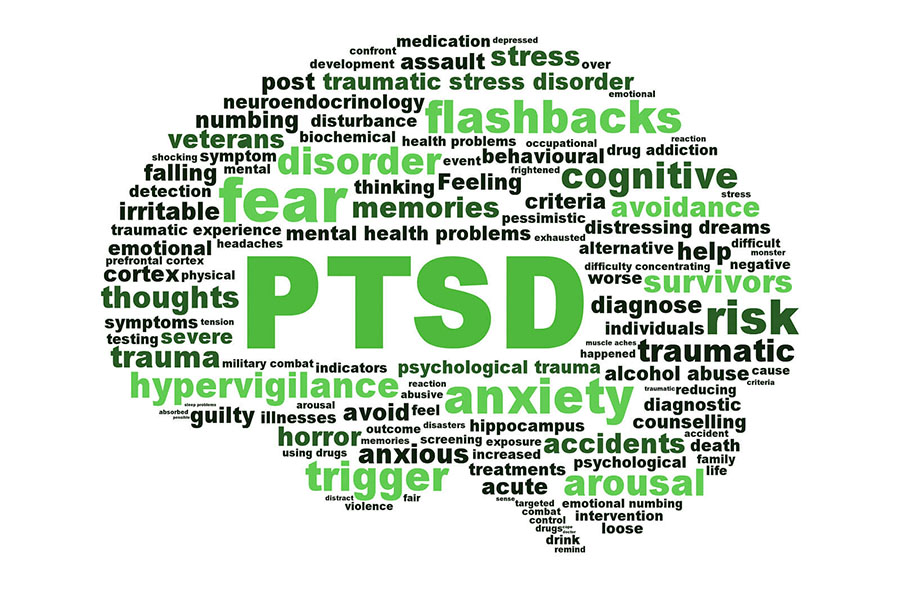Post Traumatic Stress Disorder (PTSD) is an overwhelming feeling triggered by distressing past experiences. It often presents itself in the form of intense thoughts or feelings expressed in the form of sadness, anger, frustration, and even isolation from others.
Among the most common symptoms and/or side effects of PTSD are anxiety and depression. People living with PTSD often seek therapeutic counseling to treat these underlying conditions to learn how to cope with the feelings triggered by their past trauma. There are also certain medications that doctors can prescribe to help with these conditions.
However, some people prefer more organic methods of treatment. One such option is cannabidiol (CBD), which has been known to help people with anxiety and depression to manage their feelings more effectively. Due to the potential benefits of using CBD for those conditions, the question has to be asked: can CBD be used for PTSD?
CBD for PTSD
According to the US Department of Veterans Affairs, approximately 6 out of every 100 people, or 6% of the total population, will cope with PTSD at some point in their lives. It seems like a relatively small number of cases compared to the size of the population, though it’s believed that as many as 15 million people could suffer from PTSD in a given year. Women are also more likely than men to experience that degree of trauma. Nearly 8 out of 100 women live with PTSD as opposed to 4 out of every 100 men.
Given that there is a sizeable amount of the population living with PTSD, how can CBD potentially benefit all of those people? Let’s have a look at CBD for PTSD.
Is CBD good for PTSD?
This is the 64 million dollar question: is CBD good for PTSD? The short answer is that more research is necessary to definitively confirm that fact. The long answer provides more insight into preliminary studies.
According to Medical News Today, the body’s endocannabinoid system helps manage the symptoms of PTSD. The endocannabinoid system is a complex system that regulates how cells and nerves communicate throughout the body. A healthy endocannabinoid system can help regulate better sleep and control feelings of anxiety or depression.
The endocannabinoid system includes CBD receptors that are stimulated when the body receives doses of CBD oil, edibles, or vape. These receptors can help the endocannabinoid system function appropriately, enabling it to help the body relax and allow the mind to calmly process stressful thoughts or feelings.
CBD oil dosage for PTSD
If you’re new to CBD, it’s best, to begin with, a low dosage to ease yourself into the remedy. Regular users of CBD can take daily doses as low as 5 to 10 milligrams and as high as 1,500 milligrams depending on their tolerance, body mass, and other health conditions.
Speak with your doctor about your intentions and ask for their advice on the optimal CBD oil dosage for PTSD. Unless your doctor gives a specific medical reason otherwise, you can likely begin with a dosage of 10 to 20 milligrams per day and analyze the effects of the dosage on your PTSD symptoms. If you feel a sense of relief, you’ve likely hit on an optimal dosage for your body. If not, try increasing the amount to 30 milligrams and onward until you notice a change in your symptoms.
You can test out the size and frequency of your dosage by purchasing CBD oils from trusted vendors. Most oils come with a helpful dropper that you can use to place a few drops of oil on your tongue to absorb the CBD into your system.
Help for PTSD sufferers
In addition to using CBD and other remedies, there are other ways to help loved ones who suffer from PTSD, anxiety, depression, and other mental conditions. The most important thing to keep in mind is that you should always be willing to listen and offer your support without pushing your loved one too hard to accept that support.
People who live with PTSD cope with severe stress symptoms triggered by their traumatic past. If they feel like they’re being pressured to relive the experience in their mind by talking through the incident, it could cause them to spiral into crippling anxiety or severe depression that risks their health and wellbeing.
More than anything else, you should offer to be a loving shoulder to lean on when they’re ready to talk about what happened in their past. Additionally, you can recommend and even research trained counselors who can help your loved one talk through their PTSD in a safe space. Sometimes, speaking with a professional and semi-stranger is more helpful for people with mental health conditions than being open with family or friends.
Alternative treatments for PTSD
CBD, medical pills, and psychotherapy are all common ways to treat PTSD and its underlying conditions. However, there are alternative and naturopathic treatments that can also be used to help people cope with PTSD.
Simple breathing and yoga exercises can relax the mind and push away stressful thoughts or feelings. Meditation is also a great way to stimulate the brain with a peaceful aura that can silence some of the more unnerving thoughts associated with PTSD. There are also herbal medicines that have been used in eastern cultures for generations that can help people cope with some of the overwhelming symptoms of PTSD.



